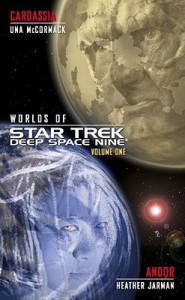
Worlds of Star Trek: DS9: #1 Cardassia by Una McCormack & Andor by Heather Jarman

"The Lotus Flower" depicts the problems and antagonism Keiko is facing in her multispecies effort to render Cardassian soil fertile again. Meanwhile, the new castellan Alon Ghemor and Garak are fighting to keep the fledgling democracy alive in the face of isolationist movements.
This is quite a good story about the rise of isolationist movements, about the recruitment of young people for extremist purposes (because they lack certainty and purpose over their own future), and about finding where you belong in a democracy that is still forming after the age-old reign of dictatory leaderships. Quite a mirror of modern politics... if just finding similarities and common ground (or at least having the intention to do so) were so easy in real life, many atrocities could be prevented, I guess.
"Paradigm" forces Shar to confront the loss of his bondmate Thriss, his guilt and his position in Andorian society... all while being under pressure by his "mother" and having increasing feelings for Prynn Tenmei.
I'm afraid I'm not going to become a friend of Jarman's style any time soon. Her prose doesn't flow as well as that of other authors and I had the feeling of being stuck on a single page for ages. So that's a definite negative point. On the other hand, by the end I was fully engaged in this story and moved by the final few scenes. Shar's being pressured by practically all sides, reminded of his duties in a diminishing Andorian society (due to reproductive issues which led to a population of 3 billion dwindling down to a mere 90 million) but also fighting for his own freedom. Because how can anyone in a society that only revolves around bonds, that are matched artificially instead of naturally, and parenting duties be free? What about individual desires such as careers or partners outside a bond? And what about those who can't withstand that pressure (like Thriss)? This is quite a melancholy story about a person who fights to escape but in the end decides to go through with his societal obligations after all, even though the outside pressure (and inborn guilt) is more or less removed from him. A decision which left me pensive.















